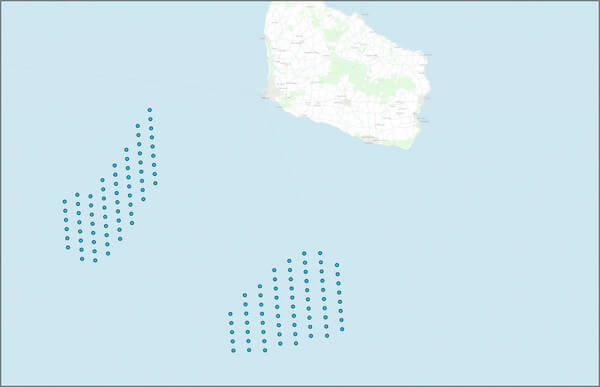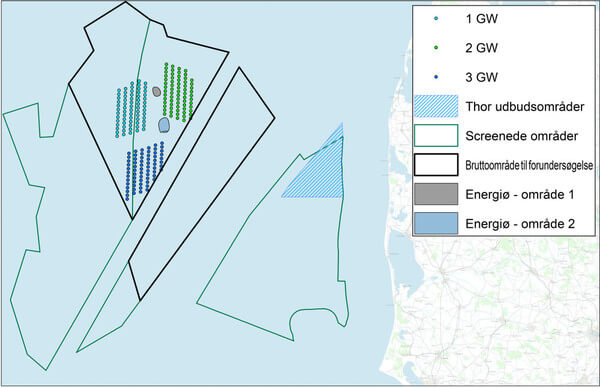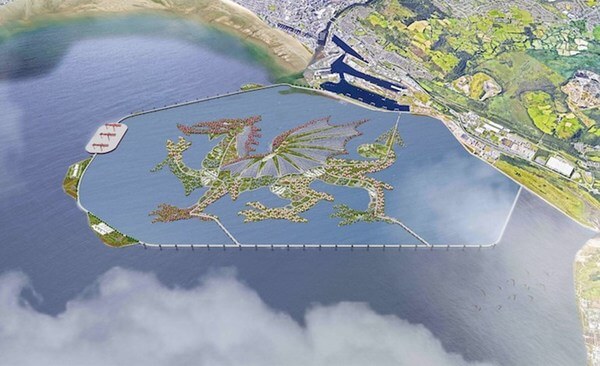News Release from windfair.net
Wind Industry Profile of
Green Light for Energy Islands
The idea behind it is simple: the electricity from several offshore wind farms is to be bundled on an artificial island, so that only one cable is needed to reach the shore. This means enormous cost savings and the possibility of supplying different riparian states with green energy at the same time.
When transmission system operator TenneT first came to public attention a few years ago with the idea of an artificial island in the North Sea, the project was still smiled at: unrealistic, too expensive, technically impossible. An international consortium, the North Sea Wind Power Hub (NSWPH), came to this conclusion only last year. But now the construction of such islands is within reach. Denmark, the world's #1 in wind power production, wants to venture into the project.

The planned offshore wind farms off Bornholm in the Baltic Sea (Photo: Danish Energy Agency)
The Danish Parliament gave the green light for the project in summer. Now the Ministry of Climate, Energy and Supply has published the plans: In the Baltic Sea, the island of Bornholm is to serve as a physical energy hub for various offshore wind farms with a capacity of up to 2 gigawatts to be built off the island's coast. From there, the electricity can be transmitted to the Danish mainland on the one hand, but also exported to neighbouring European countries on the other.
A second island for up to 3 GW - and in the long term even 10 GW - is to be built in the North Sea. By next spring, the exact location of the island and offshore wind farms there will be determined by various feasibility studies. All that is certain so far is that the project will be located at least 60 km west of Thorsminde.
What exactly this island will look like remains to be seen. Various models are conceivable, as transmission system operator Energinet explains: "Depending on the local conditions, an artificial energy island far out to sea could be constructed as a sand island, steel platforms, or a large concrete container that is lowered into place and filled with stone material."

The rough area in the North Sea has been defined, the exact location will be determined by feasibility studies (Image: Danish Energy Agency)
The two energy islands are expected to be completed in 2030 and will be able to supply a total of 5 GW of electricity. This is enough to cover the average electricity consumption of 5 million households. Denmark with a population of 5.8 million already has a very high share of wind power in its electricity mix. The remaining production volumes are to be used for a comprehensive electrification of the country, but also for the use of hydrogen.
"We are now entering a new era of the Danish wind adventure and I would like to thank the other contracting parties for a good cooperation on the site of the first two energy islands in the world. The energy islands will help to significantly increase the amount of renewable energy and at the same time we will make it possible to convert green electricity into fuels for heavy transport, both on land and at sea and in the air. In other words, the energy islands will provide the green electricity that is the prerequisite for climate-neutral Denmark and Europe of the future," says Climate Minister Dan Jørgensen.
Energinet and the international consortium North Sea Wind Power Hub have been studying and developing the idea of energy islands since 2017, and with these concrete plans, the energy islands are entering a new phase.
Meanwhile Wales has also approached the public with a planned project. An international consortium, put together by the Welsh innovation group DST, wants to bring the 'Dragon Energy Island' off the coast of Swansea to life, putting Wales at the forefront of technological innovation in green energy.
The consortium has drawn inspiration from early concepts and has incorporated various complementary elements of renewable energy into the project, DST announced. These include a ground-breaking large-scale battery technology that enables efficient and sustainable energy storage.

The project outside the town of Swansea is to be built in the shape of the Welsh heraldic animal (Image: DST)
“We’re delighted our technology can be utilised in a project of this magnitude. Our products are designed in Wales and this is an amazing opportunity for us to harness the wonderful natural resources we have in our home nation and unlock the abundance of innovation and talent we hold here” said a DST spokesperson. The Dragon Energy Island project will create more than 1000 permanent jobs for the Swansea region alone.
Rob Stewart, Leader of Swansea Council said: “Swansea bay offers an unprecedented opportunity to deliver the world’s first truly integrated tidal energy project. This project has the potential to spur a new industry not just for Swansea but for Wales and the UK. The impacts on employment and our local economy are set to be significant and perfectly timed as we address the post-covid economy."
On Dragon Energy Island, a mix of tidal power, solar and wind power plants will be built along with battery storage facilities.
- Author:
- Katrin Radtke
- Email:
- press@windfair.net
- Keywords:
- energy island, Denmark, offshore, Wales, UK, North Sea, Baltic Sea, connector, cable, wind farm, energy hub, Bornholm, Swansea, TenneT, Energinet, government








